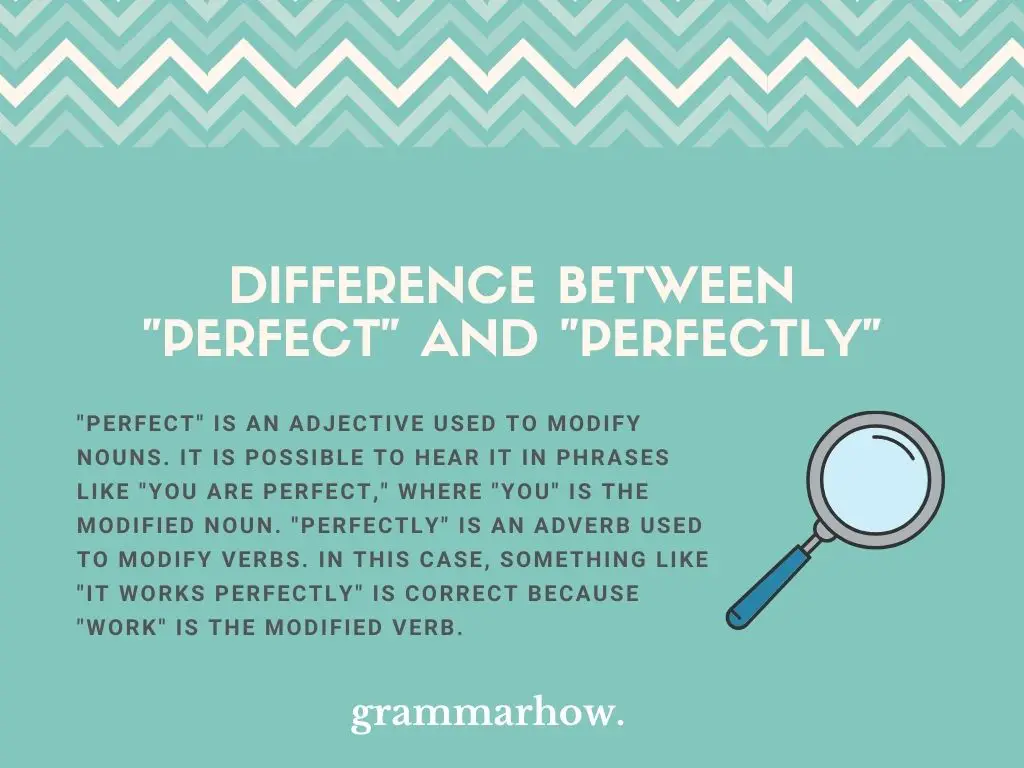Adjectives and adverbs can get confusing. Even native speakers have a hard time differentiating them sometimes, so don’t worry if you’re a bit stumped. This article will explain the differences between “perfect” and “perfectly.”
What Is The Difference Between “Perfect” and “Perfectly”?
“Perfect” is an adjective used to modify nouns. It is possible to hear it in phrases like “you are perfect,” where “you” is the modified noun. “Perfectly” is an adverb used to modify verbs. In this case, something like “it works perfectly” is correct because “work” is the modified verb.

It’s possible to hear “perfect” used interchangeably with “perfectly” when you are listening to native speakers talk. This is because spoken English doesn’t have as strict rules as written English, so the standard methods can be overlooked.
You might hear a native say either of the following:
- That worked perfectly.
- That worked perfect.
However, “Perfect” should not be used here as “worked” is a verb and not an adjective.
We do not encourage you to follow the trend of dropping adverbs just because you’re speaking to someone informally, though. It’s always best to practice proper grammar and English, meaning that “perfectly” should be best when referring to a verb or action.
How to Use “Perfect” In A Sentence
- You are perfect just the way you are. Please don’t feel like you ever need to change yourself for someone else.
- You’re not perfect yet, but you’re not a long way off! Keep working towards it, and you’ll be fine.
- This is the perfect example of how you can get adjectives right. It’s easy to see how perfect things can be.
- Stop being so perfect, please. I’m sick of having to live in your shadow all the time! I can’t keep up.
- Is this the perfect date? I feel like I hit the nail on the head when I was putting this one together.
“Perfect” is only correct as the adjective form when following standard English rules. We can use it after a pronoun (“you are perfect”) or before an object (“perfect answer”). In either case, “perfect” is the only form that works to modify them.
How to Use “Perfectly” In A Sentence
- You did this perfectly, just like I knew you would. I always know I can count on you with this stuff.
- I thought he completed it perfectly, but I guess that’s open for interpretation.
- It was done perfectly, and I don’t see a reason for it to be done again. It just doesn’t make sense to me.
- This was not handled perfectly, and I’ll be the first to admit that. Next time, I’ll get it right.
- It was working perfectly just a second ago! You must have done something to affect it because I didn’t touch it!
“Perfectly” is the adverb form. We use this whenever we are modifying a verb. It’s possible for the verb to come before (“worked perfectly”) or after (“perfectly designed”). The position of the verb is mainly based on personal preference or contextual tone.
Is It “Works Perfect” or “Works Perfectly”?
“Works perfectly” is the only correct form to use here. “Works” is the modified verb, which means that the adverb form (“perfectly”) is the only acceptable choice. “Works perfect” is a common mistake, but it’s not one that we encourage you to make.
- Correct: It works perfectly, thank you very much.
- Incorrect: I knew it works perfect. I just had to prove it.
Is It “More Perfect” or “More Perfectly”?
“More perfect” and “more perfectly” are both correct. You can use “more perfect” as a comparative adjective form, meaning a noun is still being modified. “More perfectly” is a comparative adverb form, which only works when modifying a verb.
- You look more perfect than the day I laid eyes on you. (Noun = “you”)
- You did that more perfectly than the first time I met you. (Verb = “did”)
As a side note, “more perfect” and “more perfectly” are rarely used in English. Even when they are used, they’re reserved for informal speaking only.
“Perfect” is supposed to be the highest possible degree of something, meaning it’s impossible to make something “more” perfect. That’s why neither of these forms is common, as they are redundant.
What Word Type is “Perfectly”?
“Perfectly” is an adverb. It is an extension of the root adjective form “perfect,” where the “-ly” suffix is added to show that a verb can be modified. It is used whenever we want to show that someone performed an action in a “perfect” manner.
Is It Right To Say “Perfectly”?
While we can use some adverbs as a one-word reply to someone, it is not correct to use “perfectly” in these situations. You would have to be prompted with the correct verb to use this one well, but there are always better one-word alternatives over “perfectly.”
You may also like:
Smooth or Smoothly? Difference Explained (With Examples)
Slow or Slowly? Difference Explained (With Examples)
Drive Safe Or Drive Safely? Here’s The Correct Version (+14 Examples)

Martin holds a Master’s degree in Finance and International Business. He has six years of experience in professional communication with clients, executives, and colleagues. Furthermore, he has teaching experience from Aarhus University. Martin has been featured as an expert in communication and teaching on Forbes and Shopify. Read more about Martin here.
